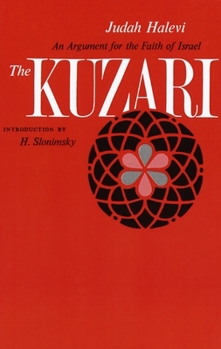The Kuzari: An Argument for the Faith of Israel
Select Format
Select Condition 
Book Overview
"The Kuzari is one of the most important works in the history of Jewish thought. Although close to a thousand years have passed since its composition, it is still very relevant." -- Rabbi Itamar Eldar... This description may be from another edition of this product.
Format:Paperback
Language:English
ISBN:0805200754
ISBN13:9780805200751
Release Date:September 1987
Publisher:Penguin Random House LLC (No Starch)
Length:320 Pages
Weight:0.73 lbs.
Dimensions:0.8" x 5.2" x 8.0"
Customer Reviews
1 rating
a classic, but definitely preaching to the converted
Published by Thriftbooks.com User , 20 years ago
This book was written as a kind of catechism to persuade Jews to stay with their faith rather than converting to Islam or Christianity. I think Jews should read it as a historical document, to understand how our ancestors explained Judaism to each other. Halevi begins by dismissing Christianity and Islam in just a few pages, pointing out that despite their alleged noble intentions, "vie with each other in committing murders, believing that this is a most pious work and brings them nearer to God." (p. 39) Christian theology is rejected in just a paragraph as illogical (p. 42), while Islam is flawed because "as long as it is written in Arabic, a non-Arab . . . cannot perceive its miraculous character." (p. 43) I doubt that these arguments would persuade a Christian or Muslim- but my suspicion is that this book was written entirely for people like me (i.e. Jews predisposed to agree). By contrast, Judaism is true because various miracles (e.g. the relevation at Sinai, the giving of Manna to the Hebrews, the parting of the Red Sea) "took place in the presence of great multitudes" (id.), unlike the relevations described in other religions. In other words, if the Torah says X happened in front of thousands of people, the Torah must be correct because our ancestors would not have been persuaded to believe such events (unlike relevation to just one person) if they did not happen. Is Halevi right? I suspect the answer depends on how gullible you think our ancestors were, and how accurately you think a tradition can be handed down. Halevi vigorously defends rabbinic tradition against the literalist Karaite sect, citing the numerous ambiguities in the Torah (pp. 166-68). In other words, because the Torah is ambiguous, traditional interpretations of the Torah must be correct, or at least necessary to ensure some uniformity of practice. By contrast, Karaism ensures that "in one house [there might be] ten persons with as many different opinions."(p. 177). (Of course, some might say that this is still the case among Jews despite the decline of Karaism). Halevi goes beyond his pragmatic attack on Karaism, and seems to imply that the whole of Jewish tradition is uninterrupted- and makes some effort to address evidence that seems to contradict this view. For example, the Book of Nehemiah apparently implies that when rebuilding the Second Temple, Jews were ignorant of the laws of Succot until Ezra informed them of same. (See Nehemiah 8:14). Halevi takes on this problem by suggesting that Jews could not possibly have forgotten such things, because they were apparently aware of other laws- in other words, that because our ancestors knew law X, they must have also known law Y (pp. 184-5). As for the Tanach's apparent suggestion that the people had forgotten Succot, Halevi explains that "the whole people gave attention to them [the laws] . . . The erudite were not unacquainted with the details of the law..." (p. 186). Halevi's interpretation would seem






